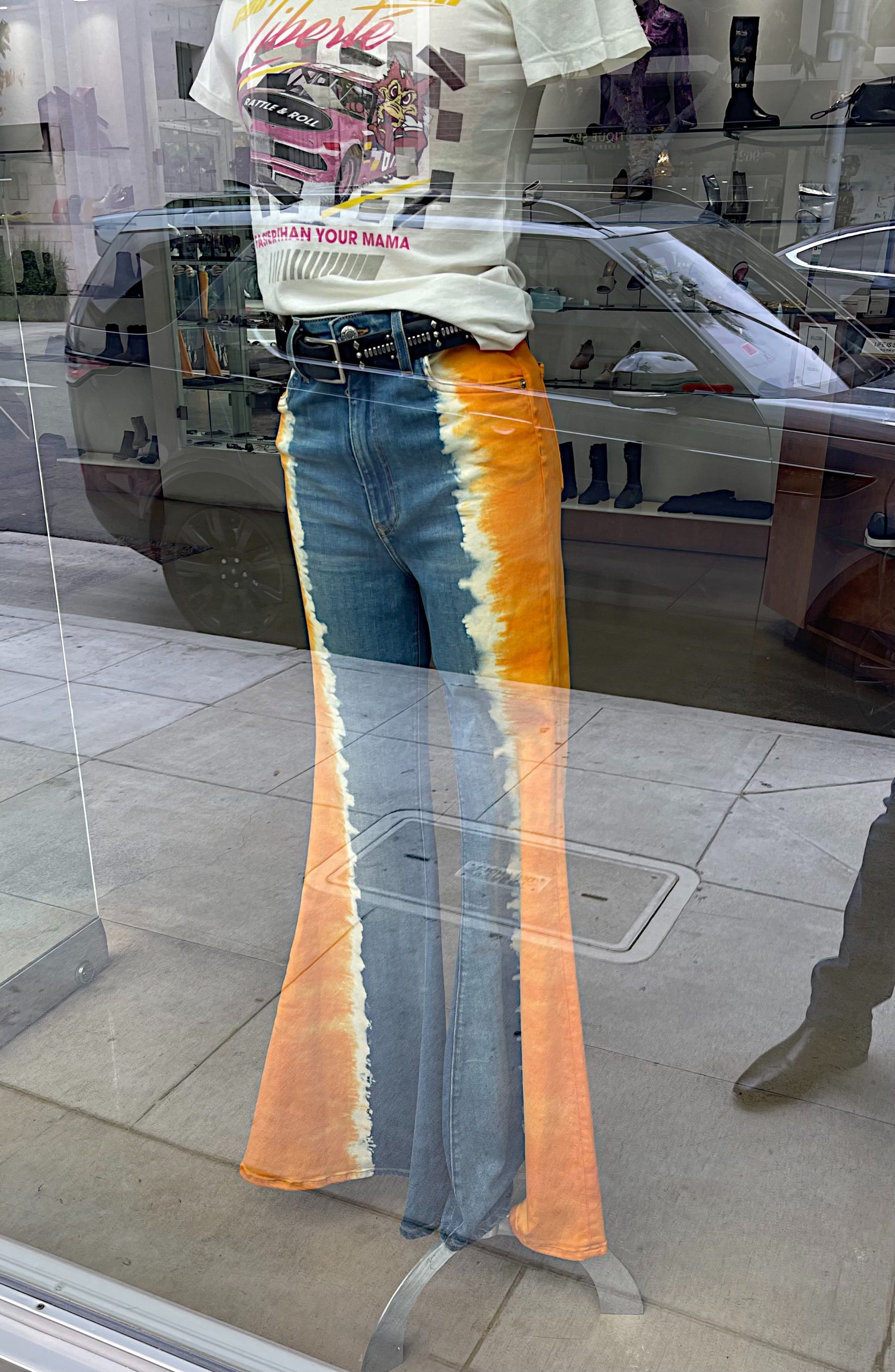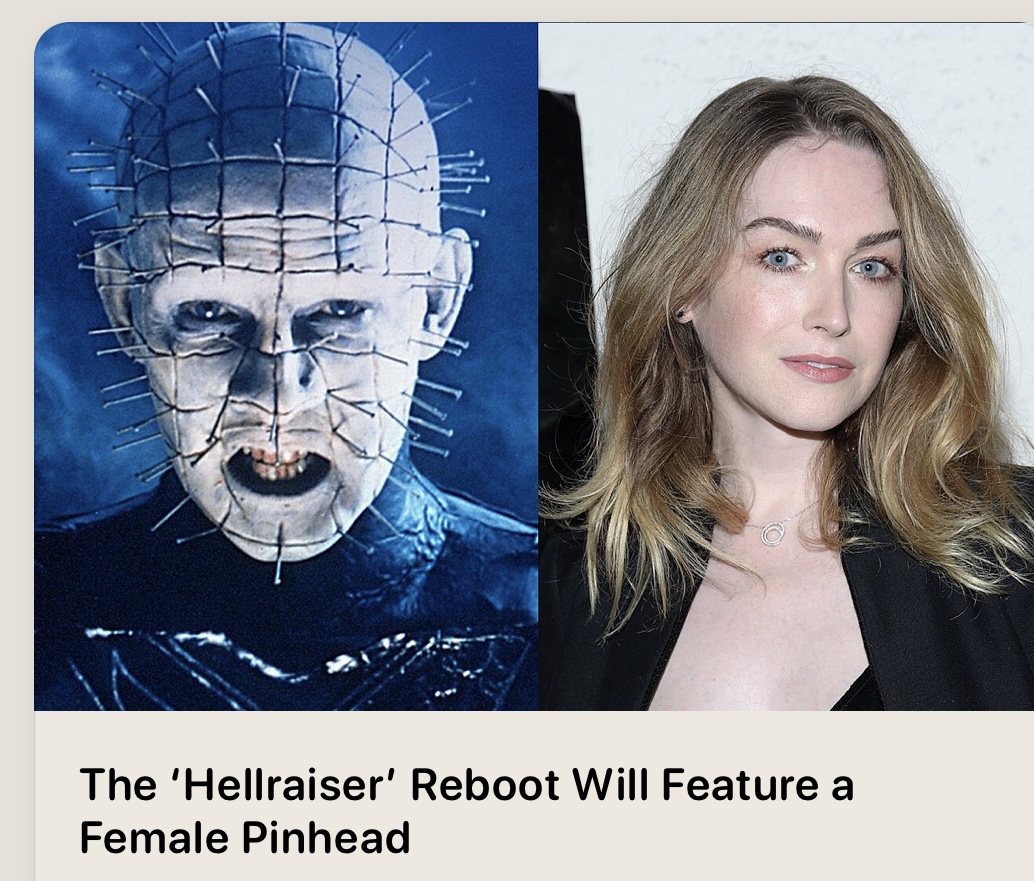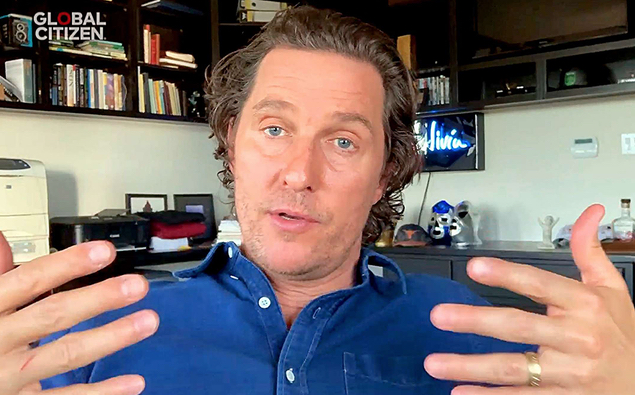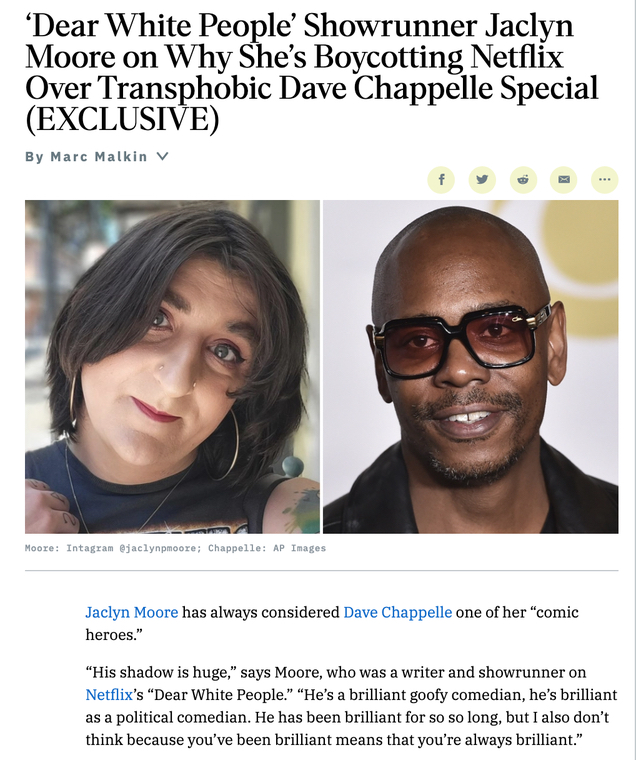Observed this morning on Brighton Way in the spirit-of-Dubai shopping district of Beverly Hills. “Flying off the shelves,” according to the woman minding the store.

Observed this morning on Brighton Way in the spirit-of-Dubai shopping district of Beverly Hills. “Flying off the shelves,” according to the woman minding the store.

Imagine being on your death bed at age 89, and telling yourself that you not only made a difference in your career but nudged things along in a human artistic and evolutionary sense when you played a female pinhead in a Hellraiser film.

In a 40-minute conversation with N.Y. Times columnist Kara Swisher, Matthew McConaughey has discussed his feelings about running for Texas governor. They basically boil down to “I don’t know, man…maybe if God gets into it and points to me and says ‘this guy…this guy can save us from the insanely polarized left-right extremes so vote him in and follow his ass’…otherwise I don’t know.”
If and when he becomes governor, McConaughey doesn’t want to just go through the motions. He wants to be a practical-minded poet philosopher slash earthy gov-bruh…a centrist reformationist blend of Sam Houston, George Washington and Martin Luther.
McConaughey #1: “One side I’m arguing is ‘exactly, that’s why you need to go get in there.’ The other side is ‘that’s a bag of rats, man. Don’t touch that with a 10-foot pole. You have another lane. You have another category to have influence and get done things you’d like to get done and help how you think you can help and even heal divides.'”
McConaughey #2: “Is that a place to make real change or is it a place where right now it’s a fixed game, you go in there, you just put on a bunch of band-aids, in four years you walk out and they rip them off and you’re gone? I’m not interested in that.”

In other words, MConaughey is more comfortable riffing on the idea of being Texas governor than actually trying to win the damn job. He doesn’t want to get his hands dirty by diving into the wrestling pit.
McConaughey is right in implying that lefty wokesters and righty Trumpsters are equally horrible, and he’s probably correct in saying that trying to rouse and activate the “sleeping giant” of centrism is the way to go now.
McConaughey #3: “People want a third party and we’ve got one and it doesn’t have a name right now and it is the majority. I’m hesitant to throw labels…but there is a sleeping giant right now. I think it’s necessary to be aggressively centric to possibly salvage democracy in America right now.”
McConaughey #4: “The left and right traffic is so far to the edge, their tires are not even on the pavement. They’re not riding the road of democracy, I don’t believe.”
There’s a two-word term that applies to McConaughey in the realm of Texas politics. That term is “honestly flakey.”
Give McConaughey credit for loving the word “partook”. And for saying “bag of rats.” That’s the best “bag of”expression I’ve heard since “bag of gas,” an Entertainment Weekly term that referred to Robert Redford‘s The Legend of Bagger Vance.
Here’s the Swisher-McConaughey transcript.
The two finest films I saw at last month’s Telluride Film Festival were Joe Wright‘s exquisitely made Cyrano (UA Releasing, 12.31) and Reinaldo Marcus Green‘s King Richard (Warner Bros., 11.19). As things currently stand, these are also the most deserving Best Picture contenders…no question. Here, at long last, is the Cyrano trailer:
Posted on 9.2.21: “I’ve been watching filmed adaptations of Edmund Rostand‘s Cyrano de Bergerac for decades (Jose Ferrer‘s 1950 version, Steve Martin‘s Roxanne, the 1990 Gerard Depardieu version, and Michael Lehmann‘s The Truth About Cats and Dogs). Wright’s newbie — an inventively choreographed musical, fortified by first-rate production design and wonderfully lighted cinematography — is arguably the most spiritually and poetically buoyant version of them all.
The acting is top-tier, the musical numbers are arresting, the dialogue is as good as this sort of thing gets, and it’s a truly authentic time-tunnel experience (save for the presentism in the casting, which is par for the course these days).
Peter Dinklage has absolutely hit the jackpot with his titular performance — he’ll definitely be Best Actor-nominated. The film will almost certainly end up being Best Picture-nominated, and I wouldn’t be surprised if the year-end consensus is that Cyrano is a “better” musical than Steven Spielberg‘s West Side Story and Jon Chu‘s In The Heights combined.
Based on Schmidt’s 2018 stage musical of the same name (in which Dinklage and Haley Bennett costarred before moving onto the film version), Cyrano is easily Wright’s best film since Anna Karenina. Seamus McGarvey‘s exquisite cinematography reminded me of David Watkins‘ lensing of Richard Lester‘s The Three Musketeers (’73) — it’s a real trip just to watch and sink into on a visual level alone.
Kudos to Cyrano costars Kelvin Harrison Jr., Bashir Salahuddin and Ben Mendelsohn.
An invitational screening of a film has just ended, and you, a journalist, were not a fan. (You wanted to be, but the film wouldn’t let you.) And now you’re on your way to the after-party.
The general etiquette is as follows: (1) The journo is obliged to be as fawning and gracious and complimentary as possible when speaking to talent or studio reps, although he/she is not obliged to lie outright about his/her reaction to the film in question; and (2) It is permissible for journos to mutter their true opinion of the film with colleagues if they happen to be out of earshot of talent or studio reps.
Case in point: “Ringo Starr’s ‘The No-No Song'”, posted on 8.28.16.
SPOILERS ALLUDED TO WITHIN THE FOLLOWING: Last night I watched Daniel Craig‘s last and final James Bond film, knowing full well what the storyline was and particularly what the ending would deliver.
And I enjoyed it thoroughly. I was never bored, and was seriously impressed with Cary Fukanaga‘s pacing, cutting, visual discipline and overall chops. There’s never any doubt that this is a grade-A package made by grade-A people. Plus it’s Craig’s best Bond since Casino Royale, and one of the best overall. And knowing about the ending didn’t fucking matter at all. There’s a difference between watching a film as an adult, and watching one as an infant.
The pleasure of any film is in the way it unfolds — that special-touch factor, the art of it, the timing, the polish, the undercurrent, the first-classiness of it all. How the story is told, not the story itself…right? Singer, not song.
Plus the whole plot is sitting on the film’s Wikipedia page. Al Pacino in The Insider: “The cat totally out of the bag…”
On top of which Craig doesn’t play a boorish old-school sexist. He never has really. He plays a good, decent, smart, non-arrogant fellow in No Time to Die, and when the big moment comes it’s rather sad and classically invested in. And that’s where I shed my single, solitary tear.
Let no one doubt that the ending of No Time To Die was written by people who are terrified of seeming tethered to the past (who isn’t?), and are triply terrified of wokester (especially #MeToo) wrath, and that the ending was written to make a point — i.e., we’re in a new world, and there’ll be no more of that old “shaken, not stirred” broth…that smooth, sexist, tuxedo-wearing, martini-sipping swagger. We’re ending that shit here and now.
And it’s completely foolish and stupid, by the way, for the film to say at the end of the closing credits that JAMES BOND WILL RETURN. No Time To Die is not a Marvel or a D.C. film.
Friendo to HE: “I can’t say for sure what the Bond producers will do, but there’s way too much money on the table for them to just say goodbye to James Bond. And Barbara Broccoli is on record as saying that the character won’t be a woman. Bond will be back, with a new actor (probably a Caucasian), and they’ll present it as a reboot.”
HE to Friendo: “But they’ve conclusively eliminated that possibility. The only way to get around this would be inject Marvel and D.C.-styled plotting.”
The Stalinist prison guard living inside Dear White People showrunner and writer Jaclyn Moore has emerged. For she’s attempting to persuade Netflix to zotz Dave Chappelle‘s The Closer because his remarks about trans people, she feels, are prejudicial and uncool.
Last night Moore stated on Twitter and Instagram that she’ll no longer work with Netflix after watching The Closer. “After the Chappelle special, I can’t do this anymore,” Moore wrote. “I won’t work for Netflix again as long as they keep promoting and profiting from dangerous transphobic content.”
If I was a Netflix honcho, I would reply to Moore as follows: “I hear you. You’re not altogether wrong. Chappelle’s views on trans women certainly don’t mirror our own, and we hope you and your community understand that. This aside, we deplore Stalinist censorship and don’t approve of efforts by anyone to muzzle anyone, least of all a brilliant comic whose entire career has been about considering the view of persons like yourself and occasionally saying ‘nope, not me, sorry.'”
HE to Moore: Anyone who partially describes Chappelle as a “goofy” comic doesn’t really hear him or get where he’s coming from, no offense. He’s not goofy or wacky, and he doesn’t live in a doo-wacky, doo-wacky, wah-wah world.
Chappelle: “In our country, you can shoot and kill a n***a, but you better not hurt a gay person’s feelings.”

Just a note to all the millions who lost their jobs over refusing to take the vaccine. I’m very sorry that you’re all idiots, and I sincerely hope that you will experience not just disruption but difficulty because of your decision. And if you get the virus and are sent to God…well, I’m not going to cheer for that outcome. But if the worst does happen, you can at least look in a mirror before you die and say “yeah, I bought that.”
Besides being a supremely elegant filmmaker and one of the eternal Movie Godz in the sky, John Ford was brusque and cantankerous, a fucktard, a snarly prick, an alcoholic ass, flinty and cruel and a genuine shit. Occasionally.
On the other hand James Stewart, one of the greatest all-time actors and a phenomenally gifted raconteur, was apparently a bit of a racist. From a strict wokester perspective.
How else to describe one who uses the term “Uncle Remus” as an adjective (as recounted in the below excerpt from Directed by John Ford) and, worse, uses the term “negro” twice in the same clip. This was in ’69 or ’70, remember, at which point the culture had abandoned that term and moved on to “black.”
Certain films have been cancelled for disturbing racist attitudes (Gone With The Wind, Song of the South, The Birth of a Nation) — why not posthumously cancel certain actors whose past sentiments don’t jibe with present-day standards?
We need to create a Hollywood panel of fair-minded Stalinist judges who can review how out-of-line certain actors were when they said this or that back in the ’60s or ’50s or whenever, and if they fail the woke test, their careers and achievements can be erased on the Academy website and at the Academy Museum.
True story: “I was driving along Melrose Ave. near Doheny in late 1983. (Or was it early ’84?) I noticed that a new BMW in front of me had a framed license plate that came from a dealer in Westport, Connecticut, where I had lived only five years earlier and which is next to my home town of Wilton.
“I pulled alongside the Beemer and saw right away that the driver was Anne Baxter, who looked pretty good for being 60 or thereabouts. I rolled down my window and said, “Hey, Westport…I’m from Wilton!” And Baxter waved and smiled and cried out “Hiiiiii!” [Originally posted on 2.8.13.]
I realize that many Millennials and Zoomers have no idea who Baxter was, but eventually a generation will come along that has never heard of them. I can’t recall the name of the Westport dealership where Baxter bought her Beemer. For decades Baxter lived at 25 Knapp Street in Easton.
When it comes to nude scenes, women don’t have to worry about whether they’re showing attractive equipment when the director shouts “action!” But guys do, of course. In Terry Southern‘s “Blue Movie” a coarse, Joseph E. Levine-like producer named Sid Krassman is persuaded by a Stanley Kubrick-like director named Boris to perform in a sex scene, and Krassman is very worried about not having enough “heft” before filming begins. We’re all familiar with “some show, others grow.” We all want to be horses but male biology has never been especially obliging in that regard.